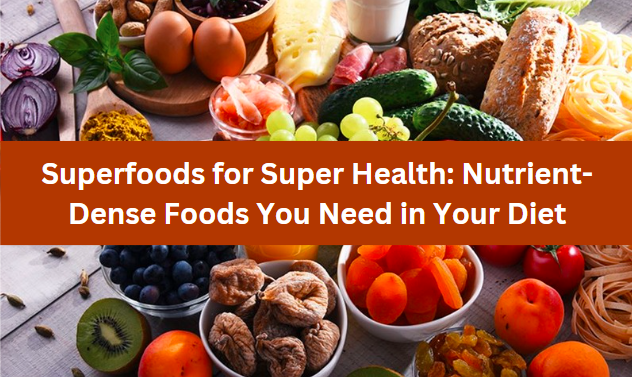Contents
Introduction
In the quest for optimal health and wellness, superfoods have gained immense popularity. These nutrient-dense foods are packed with vitamins, minerals, antioxidants, and other essential nutrients that provide numerous health benefits. Incorporating superfoods into your diet can enhance your overall well-being, boost your immune system, and reduce the risk of chronic diseases. This guide explores some of the most potent superfoods and how they can contribute to super health.
What Are Superfoods?
Superfoods are foods that are exceptionally rich in nutrients and beneficial compounds. They offer superior health benefits due to their high content of vitamins, minerals, antioxidants, and phytochemicals. While no single food can provide all the nutrients your body needs, superfoods can play a significant role in a balanced diet.
Top Superfoods to Include in Your Diet
1. Berries
Berries such as blueberries, strawberries, raspberries, and blackberries are packed with antioxidants, fiber, and vitamins.
- Health Benefits:
- High in antioxidants that protect against oxidative stress and inflammation.
- Rich in fiber, which aids digestion and supports heart health.
- Low in calories but high in essential nutrients like vitamin C and manganese.
2. Leafy Greens
Leafy greens like spinach, kale, and Swiss chard are loaded with vitamins, minerals, and fiber.
- Health Benefits:
- High in vitamin K, which is essential for bone health and blood clotting.
- Contains antioxidants like lutein and zeaxanthin, which support eye health.
- Rich in folate, iron, calcium, and potassium.
3. Nuts and Seeds
Nuts and seeds, including almonds, walnuts, chia seeds, and flaxseeds, are excellent sources of healthy fats, protein, and fiber.
- Health Benefits:
- Provide omega-3 fatty acids, which support heart and brain health.
- High in protein and fiber, promoting satiety and weight management.
- Rich in vitamins and minerals like vitamin E, magnesium, and selenium.
4. Fatty Fish
Fatty fish such as salmon, mackerel, and sardines are rich in omega-3 fatty acids, protein, and essential nutrients.
- Health Benefits:
- Omega-3 fatty acids reduce inflammation and support heart health.
- High-quality protein aids muscle repair and growth.
- Contains important vitamins like vitamin D and B12.
5. Avocado
Avocado is a unique fruit that is high in healthy fats, fiber, and various essential nutrients.
- Health Benefits:
- High in monounsaturated fats, which are heart-healthy and help reduce bad cholesterol.
- Rich in fiber, promoting digestive health and weight management.
- Packed with potassium, vitamin E, and B vitamins.
6. Quinoa
Quinoa is a gluten-free whole grain that is high in protein, fiber, and various vitamins and minerals.
- Health Benefits:
- Complete protein source, providing all nine essential amino acids.
- High in fiber, aiding digestion and reducing the risk of chronic diseases.
- Contains iron, magnesium, phosphorus, and manganese.
7. Garlic
Garlic is a flavorful superfood with powerful medicinal properties.
- Health Benefits:
- Contains allicin, which has antibacterial, antiviral, and antifungal properties.
- Supports heart health by reducing blood pressure and cholesterol levels.
- Boosts the immune system and fights inflammation.
8. Green Tea
Green tea is a popular beverage known for its antioxidant content and health benefits.
- Health Benefits:
- Rich in catechins, which are powerful antioxidants that protect against cell damage.
- Enhances brain function and increases fat burning.
- Reduces the risk of chronic diseases, such as heart disease and cancer.
9. Sweet Potatoes
Sweet potatoes are nutrient-dense root vegetables that are high in vitamins, minerals, and fiber.
- Health Benefits:
- High in beta-carotene, which is converted to vitamin A and supports eye health.
- Rich in fiber, promoting digestive health and regulating blood sugar levels.
- Contains vitamins C and E, potassium, and manganese.
10. Dark Chocolate
Dark chocolate is a delicious superfood that is rich in antioxidants and minerals.
- Health Benefits:
- High in flavonoids, which have antioxidant and anti-inflammatory properties.
- Supports heart health by improving blood flow and lowering blood pressure.
- Enhances brain function and mood.
How to Incorporate Superfoods into Your Diet
Balanced Meals
Incorporate superfoods into your meals by adding them to salads, smoothies, and main dishes. For example, top your oatmeal with berries and nuts, or add spinach and avocado to your sandwiches.
Healthy Snacks
Choose superfoods for snacks, such as a handful of nuts, a piece of dark chocolate, or a green tea latte. These options provide nutrients and energy between meals.
Cooking and Baking
Use superfoods in your cooking and baking. Add quinoa to soups and stews, use sweet potatoes in casseroles, and incorporate garlic into sauces and marinades.
Variety and Moderation
While superfoods are nutritious, it’s essential to consume a variety of foods for a balanced diet. Avoid over-relying on any single superfood and enjoy them in moderation as part of a diverse and nutrient-rich diet.
Conclusion
Incorporating superfoods into your diet can significantly enhance your health and well-being. These nutrient-dense foods provide essential vitamins, minerals, antioxidants, and other beneficial compounds that support overall health. By making mindful choices and adding a variety of superfoods to your meals and snacks, you can enjoy the numerous health benefits they offer. Prioritize a balanced diet rich in superfoods to achieve super health and vitality.




